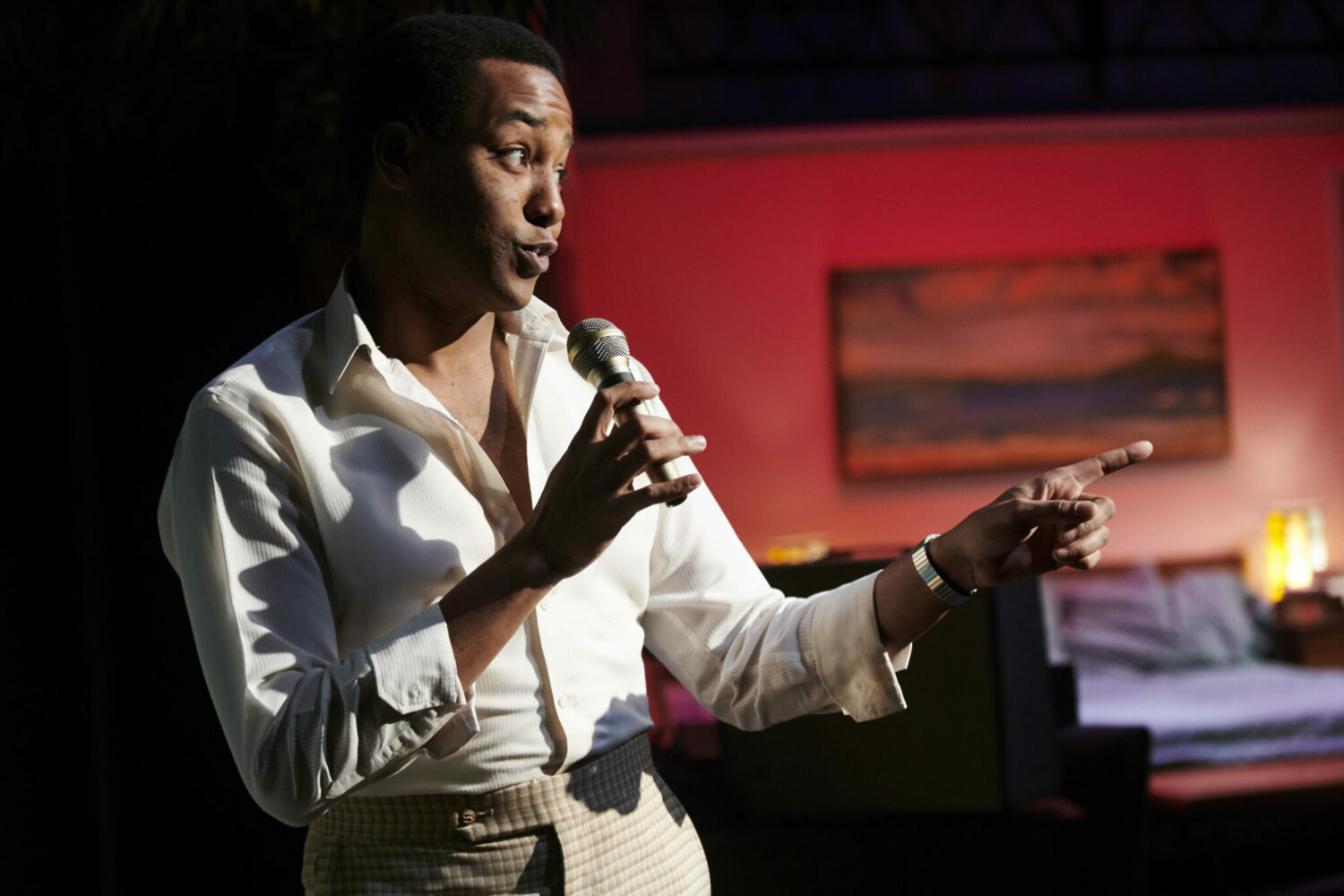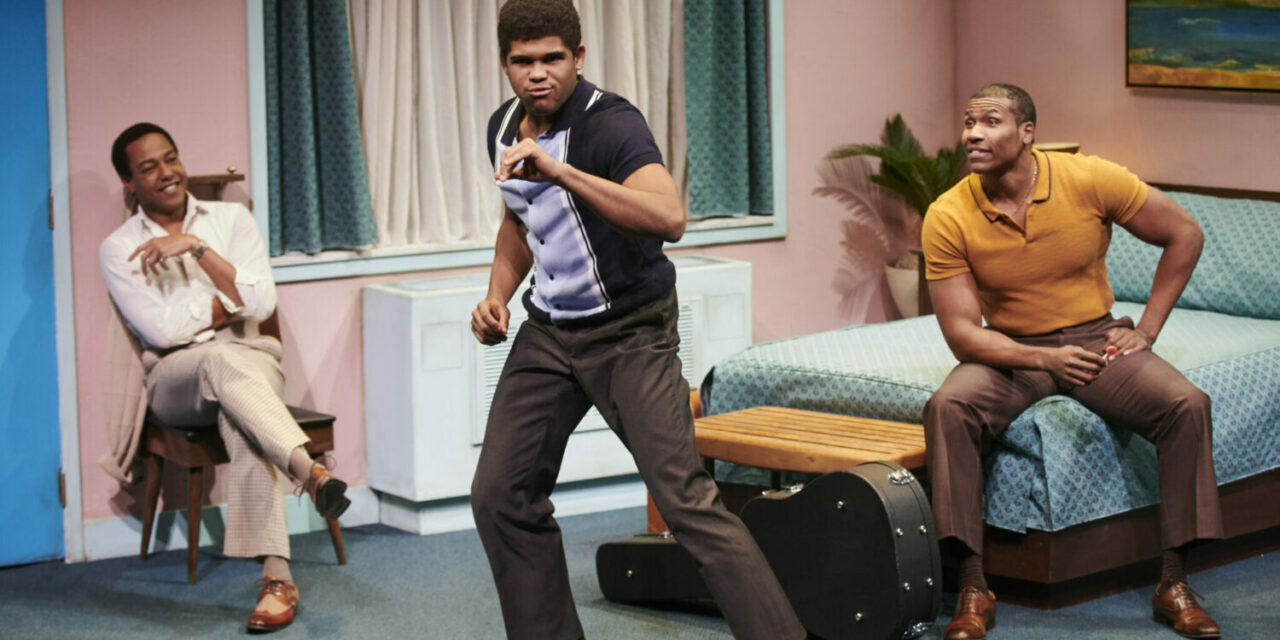After he won the World Heavyweight Championship by roundly defeating Sonny Liston on February 25th, 1964, Cassius Clay celebrated his victory in private with three friends: R & B star Sam Cooke, political activist Malcolm X, and professional football record-setter Jim Brown. There’s no record of what they did together that evening; in One Night in Miami…, playwright Kemp Powers has taken that gap in the historical record as inspiration to imagine what these four friends might have talked about.
In Powers’s historically specific and richly imagined recreation, the discussion centers on the men’s keenly felt responsibility to use their accomplishments and renown to lead the struggle for black equality and civil rights. The three older men have each approached that responsibility in different ways. Brown (Quincy Chad), embraces the idea that he can make a difference by being an exemplar of black excellence, combating racism by showing the world through his achievements that blacks are not inferior to whites; Cooke (Dwayne Washington) believes that the best way to help his community is through economic opportunity, and he uses his fame and access to opportunity to help other black artists navigate the music industry and make money; and Malcolm X (Avery Glymph, an eerie lookalike in the role), aims to advance the cause through political advocacy and activism. The play’s main conflict comes when Malcolm X accuses Sam Cooke of being a sellout and tries to convince him put his voice and talents in service of advocating more directly and passionately for black rights.
This is a talky play, but under Reginald L. Douglas’s loving direction the production’s tensions are many and palpable, and it has theatrical moments that are highly rewarding. In the former category, there is the vaguely menacing role played by Malcolm X’s two Nation of Islam bodyguards, Kareem (Lamar K. Cheston) and Jamaal (Brenden Peifer) – Malcolm X alludes to his fraught relationship with the Muslim Brotherhood and its charismatic (and hypocritical) leader Elijah Muhammad throughout the conversation, and it helps to remember that less than a year later, Malcolm X will be assassinated by three men similar to the two who have been assigned to “guard” him on this February evening. In the latter category are the lyrical flights the production takes at key moments when lights (designed with sensitivity by Andrew David Ostrowski) shift the mood into a different register and we get a glimpse into the talent and greatness that catapulted each of these men into the top of their field. Particularly stunning is a segment in which Cooke steps out of the present moment and into an impromptu recreation of one of his concerts, a performance that sends Clay and Brown into spasms of ecstasy. Washington has an incredible voice, and he masterfully channels Cooke’s persona and style – his renditions of “You Send Me” and “Change is Gonna Come” alone are worth the price of admission.

Dwayne Washington as Sam Cooke. Photo by Kristi Jan Hoover, courtesy City Theatre.
Cooke, too, will die within two years of this night, and while the play is very focused on the conflict between Cooke and Malcolm X, our knowledge of who and what Cassius Clay (Thomas Walter Booker) will become as history unspools helps explain what this play is really about. At twenty-two, when the play takes place, he is still finding his voice as a leader of the movement; in many ways, Powers imagines this evening as his apprenticeship in black leadership, since he will go on, as Muhammad Ali, to combine the qualities of all three of his friends as a figurehead of the black civil rights movement. Like Brown, he was an iconic figure of racial pride and exemplar of black excellence; like Cooke, he leveraged his own success to uplift and provide economic opportunity for other members of the black community; and like Malcolm X, he converted to Islam and became a leading advocate for civil rights and humanitarian causes. Ali carried forward the torch his friends helped light; with this production, Powers, Douglas, and their fine ensemble of actors continue the legacy and hand responsibility for leading change on to a new generation.
This article was originally posted in The Pittsburgh Tatler on 29 November 2019 and has been reposted with permission. To read the original article, click here.
This post was written by the author in their personal capacity.The opinions expressed in this article are the author’s own and do not reflect the view of The Theatre Times, their staff or collaborators.
This post was written by Wendy Arons.
The views expressed here belong to the author and do not necessarily reflect our views and opinions.


















